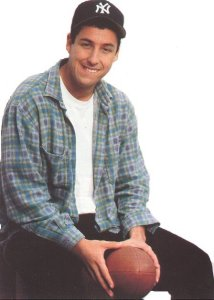| Adam Sandler Films
Sandler proved the commercial success of the critically panned
"Billy Madison" was no fluke by co-writing another low-brow starring
vehicle, the golfing comedy "Happy Gilmore" (1996), which took in
more than $40 million. Adding further proof of his box-office
appeal, that year's "Bulletproof", teaming him with Damon Wayans,
opened at Number 1, but none of these coups prepared anyone for the
breakout phenomena of "The Wedding Singer" (1998), a relatively
sophisticated product (by Sandler's standards) which grossed $80
million and finally brought women to the ranks of what had
previously been his male fan base. He reverted to his classic
outsider image for "The Waterboy" (also 1998), its $39 million
opening weekend flying in the face of conventional wisdom saying
moviegoers prefer more serious fare in the fall. With everyone
calling him the heir-apparent to Jim Carrey's low-comedy throne,
Sandler, whose underdog quality and vulnerability separates him from
his comic peers, headlined "Big Daddy" (1999), as a slacker who
adopts a boy to win back his girlfriend. The film had more heart
than "The Waterboy" and while it was not as overwhelmingly succesful,
it did register as another solid hit for Sandler. While helping
fellow SNL alumnis out by producing their comedies ("Joe Dirt" for
David Spade in 2001 and "The Animal" for Rob Schneider, also in
2001) he put out the mediocre comedy "Little Nicky" in 2001. He
followed up with "Mr. Deeds" in 2002 which also performed poorly,
suggesting maybe Sandler's golden touch was beginning to tarnish.
Perhaps sensing the need for a change of direction, Sandler
starred opposite Emily Watson in the critically acclaimed dramatic
comedy "Punch-Drunk Love" (2002) which premiered at Cannes and took
home The Golden Palm award there. Taking on a more mature role in
the romantic comedy created expressly for him by writer-director
Paul Thomas Anderson, Sandler successfully built upon his likeable
sad-sack persona and added darker edges in a more true-to-life
scenario. The new dimension impressed both critics and moviegoers.
In 2003, Sandler joined Jack Nicholson as the unlikely pair took on
the roles of patient and therapist in the clever David Dorfman
comedy "Anger Management," with Sandler's uptight, rage-repressed
everyman serving as the perfect foil for Nicholson's wild-eyed,
unshaven and slightly psycho psychotherapist.
Sandler reunited with his "Wedding Singer" co-star Barrymore for
"50 First Dates" (2004), a romantic comedy that cast Sandler as
Henry Roth, a man who falls in love with a woman with a disorder
that eliminates her short-term memory and forces him to woo her anew
each and every day. The actor was better served in his next project,
writer-director James L. Brooks' "Spanglish" (2004), playing a chef
grappling with the challenges of his out-of-control wife (Tea Leoni)
and the emotional damage she inflicts on their daughter, even as he
is attracted to the beautiful and sensitive maid who doesn't speak
English (Paz Vega). The film's serio-comic tone did not work for
everyone, but Roger Ebert summed up the opinion of most critics when
he said of Sandler's performance that he likes Adam Sandler most
when he's not in typical Adam Sandler movies. The actor delivered
another sweet and sensitive portrayal suggesting that he, if not all
of his fans, had evolved away from the wacky, "dumb guy" comedies
that made him a superstar. His remake of prison football comedy "The
Longest Yard" (2005)--with Sandler in the Burt Reynolds role of a
jailed NFL quarterback leading a team of inmates against their
guards--was a half-step backward: although missing much of the
original's charm and edge, it proved popular at the box office.
-taken from
Yahoo Movies- |
 |